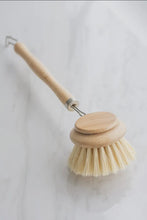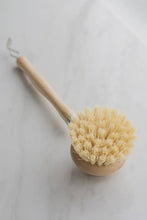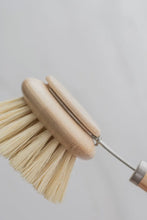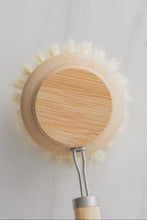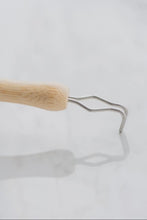
Description / No Tox Life® Moso bamboo brush, with stiff agave fiber (vegan) plant bristles.
CASA AGAVE® sustainable dish brush swap helps you replace plastic dish brushes in the kitchen!
This removable-head dish brush has a Moso Bamboo handle and brush head, with stiff agave fiber (vegan) plant bristles. It is held together with silver metal wire, and includes a small wire loop at the end for hanging dry.
Materials / Bamboo grown without pesticides. Agave fiber (plant fiber) bristles. Metal staples to hold the bristles. Sealed with a water-based polyurethane (non-plastic synthetic material similar to rubber) varnish.
Agave Fiber: CASA AGAVE® agave fiber bristles are grown, harvested, sun-dried and processed in Mexico using traditional techniques to ensure a high quality and strong natural fiber.
Alternative to / Most kitchen scourers are made of plastic or metal and are not biodegradable. Replaces plastic dish sponge.
Longevity / Each brush can be used for 3 months or longer depending on frequency of usage and proper storage.
Replacement heads available for purchase.
Care / To reduce cracking, keep the wood parts dry and do not soak or submerge them in water. You can oil your brushes to reduce the potential of cracking if you regularly submerge your dish brushes in water.
The brush head is fully replaceable so when it is worn out, slide it out from the metal wire and replace the head. Keep reusing the handle until it is worn out. Don't apply undue pressure on the handle or it will break.
Properly caring for your brushes will make them last longer. Extending the life of your products means that you can use them longer and replace them less often.
A good habit: After you've used your dish brush, make sure is is not left with bits of food in between the bristles. Then give them a good shake to get rid of as much water as possible. Hang dry if possible, otherwise make sure they rest on the counter bristle side down to air dry.
Do NOT leave brush in the water. Place on completely DRY surface after using. Do NOT leave brush on top of dish soap bar.
Do NOT put your bamboo products into the dishwasher.
You can do a vinegar bath to extend the life of your brush - Fill a shallow pan with enough vinegar to submerge the bristles (only the bristles!) and let it sit for about an hour.
Why it matters: Plastic bristle scrub brushes shed tiny pieces of plastic called micro plastics. Unfortunately these tiny plastic pieces are not filtered out fully by sewage treatment. So when you hear about the "Great Pacific Garbage Patch" the majority of this garbage patch in the Pacific Ocean is actually tiny pieces of plastic that aren't even visible to the human eye.
These tiny plastic pieces are being eaten by marine animals and ending up in the food chain, being consumed by humans in sushi restaurants around the globe! And if you're vegan, they are ending up in our tap water too. Help us turn off the plastic tap and choose a more sustainable option for humans and the planet.





